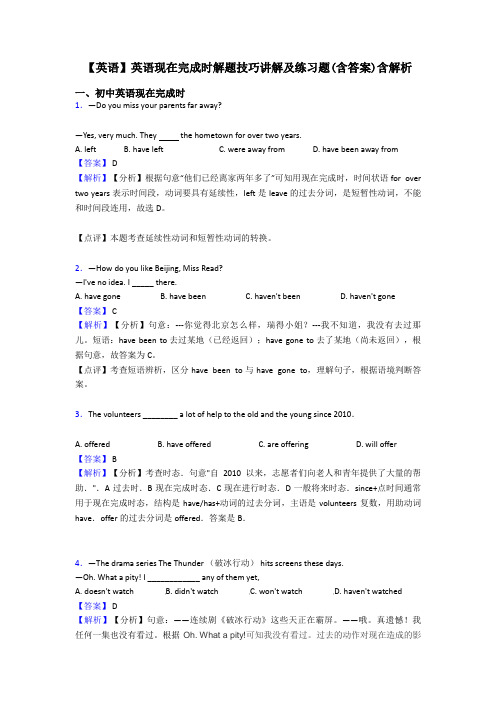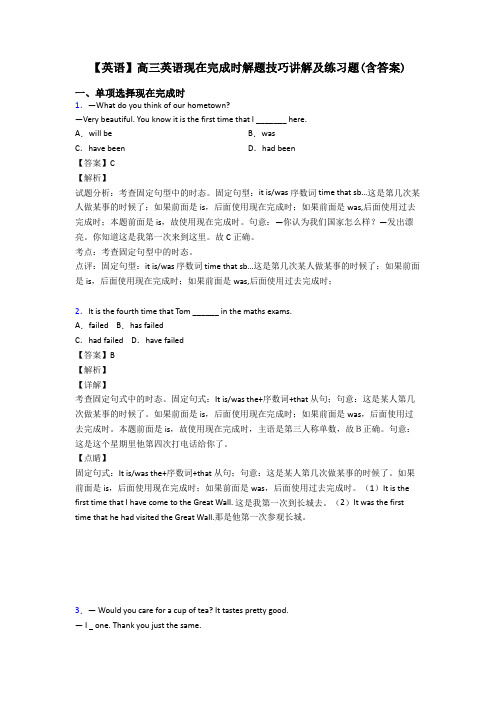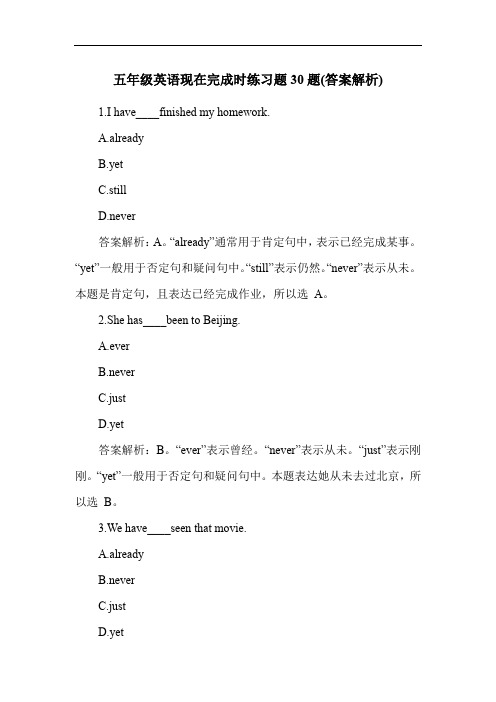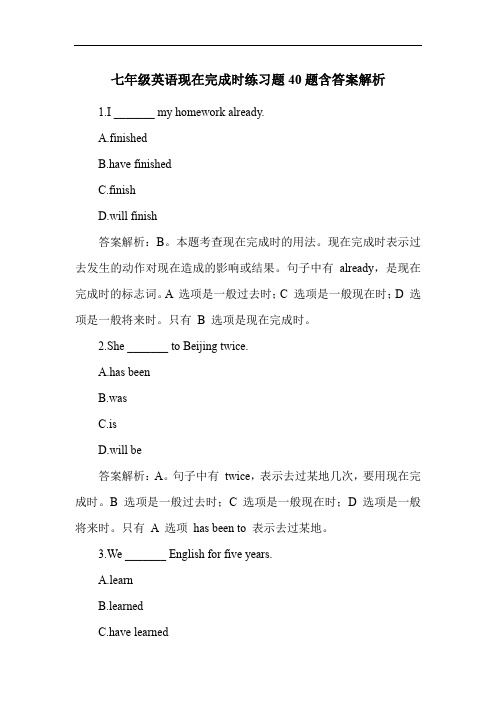现在完成时讲解及练习题含答案
现在完成时专项练习题及答案解析

现在完成时专项练习题及答案解析一、练习题1. 选择正确的现在完成时形式填空。
(1) I _______ (already/just) _______ (finish) my homework.(2) She _______ (already/just) _______ (finish) her dinner.2. 选择正确的现在完成时形式填空。
(1) They _______ (already/just) _______ (arrive) at the airport.(2) He _______ (already/just) _______ (leave) the office.3. 选择正确的现在完成时形式填空。
(1) We _______ (already/just) _______ (eat) our lunch.(2) You _______ (already/just) _______ (finish) your work.4. 选择正确的现在完成时形式填空。
(1) She _______ (already/just) _______ (start) her new job.(2) He _______ (already/just) _______ (finish) his project.5. 选择正确的现在完成时形式填空。
(1) They _______ (already/just) _______ (arrive) at the hotel.(2) I _______ (already/just) _______ (leave) the house.二、答案解析1. (1) already finish (2) just finish解析:在第一题中,"already"用于强调动作已经完成,而"just"用于强调动作刚刚完成。
因此,根据句意,第一个空应填"already",第二个空应填"just"。
现在完成时练习题及答案

现在完成时练习题及答案一、选择题1、 I ______ my homework yetA haven't finishedB have finishedC finishedD didn't finish答案:A解析:yet 常用于现在完成时的否定句和疑问句中,现在完成时的构成是“have/has +过去分词”,否定形式是“haven't/hasn't +过去分词”,A 选项 haven't finished 符合现在完成时的否定形式。
2、 They ______ in this city since 2008、A liveB livedC have livedD are living答案:C解析:“since +时间点”是现在完成时的标志,现在完成时的构成是“have/has +过去分词”,C 选项 have lived 符合现在完成时的结构。
3、 Have you ever ______ to Beijing?A goneB beenC wentD go答案:B解析:have been to 表示“去过某地(已经回来)”,have gone to 表示“去了某地(还没回来)”,根据句意“你曾经去过北京吗?”,这里表示去过且已经回来,所以用 have been to,B 选项 been 符合。
4、 My father ______ the Party since 1978、A joinedB has joinedC was inD has been in答案:D解析:“since +时间点”是现在完成时的标志,join 是短暂性动词,不能与时间段连用,要转化为 be in,现在完成时的构成是“have/has +过去分词”,D 选项 has been in 符合现在完成时的结构。
5、—How long ______ you ______ here?—For two yearsA have; studiedB did; studyC do; studyD will; study答案:A解析:根据答语“For two years”可知问句要用现在完成时,现在完成时的构成是“have/has +过去分词”,A 选项 have; studied 符合现在完成时的结构。
【英语】英语现在完成时解题技巧讲解及练习题(含答案)含解析

【英语】英语现在完成时解题技巧讲解及练习题(含答案)含解析一、初中英语现在完成时1.—Do you miss your parents far away?—Yes, very much. They the hometown for over two years.A. leftB. have leftC. were away fromD. have been away from【答案】 D【解析】【分析】根据句意“他们已经离家两年多了”可知用现在完成时,时间状语for over two years 表示时间段,动词要具有延续性,left是 leave的过去分词,是短暂性动词,不能和时间段连用,故选D。
【点评】本题考查延续性动词和短暂性动词的转换。
2.—How do you like Beijing, Miss Read?—I've no idea. I _____ there.A. have goneB. have beenC. haven't beenD. haven't gone【答案】 C【解析】【分析】句意:---你觉得北京怎么样,瑞得小姐?---我不知道,我没有去过那儿。
短语:have been to去过某地(已经返回);have gone to去了某地(尚未返回),根据句意,故答案为C。
【点评】考查短语辨析,区分have been to与have gone to,理解句子,根据语境判断答案。
3.The volunteers ________ a lot of help to the old and the young since 2010.A. offeredB. have offeredC. are offeringD. will offer【答案】 B【解析】【分析】考查时态.句意"自2010以来,志愿者们向老人和青年提供了大量的帮助.".A过去时.B现在完成时态.C现在进行时态.D一般将来时态.since+点时间通常用于现在完成时态,结构是have/has+动词的过去分词,主语是volunteers复数,用助动词have.offer的过去分词是offered.答案是B.4.—The drama series The Thunder (破冰行动) hits screens these days.—Oh. What a pity! I ____________ any of them yet,A. doesn't watchB. didn't watchC. won't watchD. haven't watched【答案】 D【解析】【分析】句意:——连续剧《破冰行动》这些天正在霸屏。
【英语】高三英语现在完成时解题技巧讲解及练习题(含答案)

【英语】高三英语现在完成时解题技巧讲解及练习题(含答案)一、单项选择现在完成时1.―What do you think of our hometown?―Very beautiful. You know it is the first time that I _______ here.A.will be B.wasC.have been D.had been【答案】C【解析】试题分析:考查固定句型中的时态。
固定句型:it is/was 序数词time that sb…这是第几次某人做某事的时候了;如果前面是is,后面使用现在完成时;如果前面是was,后面使用过去完成时;本题前面是is,故使用现在完成时。
句意:—你认为我们国家怎么样?—发出漂亮。
你知道这是我第一次来到这里。
故C正确。
考点:考查固定句型中的时态。
点评:固定句型:it is/was 序数词time that sb…这是第几次某人做某事的时候了;如果前面是is,后面使用现在完成时;如果前面是was,后面使用过去完成时;2.It is the fourth time that Tom ______ in the maths exams.A.failed B.has failedC.had failed D.have failed【答案】B【解析】【详解】考查固定句式中的时态。
固定句式:It is/was the+序数词+that 从句;句意:这是某人第几次做某事的时候了。
如果前面是is,后面使用现在完成时;如果前面是was,后面使用过去完成时。
本题前面是is,故使用现在完成时,主语是第三人称单数,故B正确。
句意:这是这个星期里他第四次打电话给你了。
【点睛】固定句式:It is/was the+序数词+that 从句;句意:这是某人第几次做某事的时候了。
如果前面是is,后面使用现在完成时;如果前面是was,后面使用过去完成时。
(1)It is the first time that I have come to the Great Wall. 这是我第一次到长城去。
中考英语现在完成时练习题20题(带答案)

中考英语现在完成时练习题20题(带答案)1.I have known him_____I was a child.A.sinceB.forC.whenD.before答案解析:A。
“since+过去时间点”表示从过去某一时间点开始,一直持续到现在,符合现在完成时用法。
选项B“for+时间段”也用于现在完成时,但题干中不是时间段;选项C“when”引导时间状语从句,一般不与现在完成时连用;选项D“before”不符合此语境。
2.She_____her homework already.A.has finishedB.finishedC.will finishD.finishes答案解析:A。
“already”是现在完成时的标志词,所以用has finished。
选项B 是一般过去时;选项C 是一般将来时;选项D 是一般现在时。
3.They_____to Beijing twice.A.have goneB.have beenC.wentD.go答案解析:B。
“have been to”表示去过某地,人已经回来;“have gone to”表示去了某地,人还没回来。
根据twice 可知去过两次且人已经回来,用have been。
选项C 和D 分别是一般过去时和一般现在时。
4.He_____the book for two days.A.has borrowedB.borrowedC.has keptD.kept答案解析:C。
“for two days”是时间段,要用延续性动词,borrow 是短暂性动词,keep 是延续性动词,现在完成时用has kept。
选项 A 和B 中borrow 不能与时间段连用;选项D 是一般过去时。
5._____you ever_____to Shanghai?A.Have,beenB.Have,goneC.Did,goD.Were,go答案解析:A。
ever 是现在完成时的标志词,“have been to”表示去过某地,人已经回来;“have gone to”表示去了某地,人还没回来。
五年级英语现在完成时练习题30题(答案解析)

五年级英语现在完成时练习题30题(答案解析)1.I have____finished my homework.A.alreadyB.yetC.stillD.never答案解析:A。
“already”通常用于肯定句中,表示已经完成某事。
“yet”一般用于否定句和疑问句中。
“still”表示仍然。
“never”表示从未。
本题是肯定句,且表达已经完成作业,所以选A。
2.She has____been to Beijing.A.everB.neverC.justD.yet答案解析:B。
“ever”表示曾经。
“never”表示从未。
“just”表示刚刚。
“yet”一般用于否定句和疑问句中。
本题表达她从未去过北京,所以选B。
3.We have____seen that movie.A.alreadyB.neverC.justD.yet答案解析:A。
“already”用于肯定句中,表示已经看过那部电影。
“never”表示从未,不符合语境。
“just”刚刚,不太符合此处语义。
“yet”用于否定句和疑问句中。
所以选A。
4.Have you____read this book?A.everB.neverC.justD.yet答案解析:A。
“ever”用于疑问句中,表示曾经。
“never”从未,一般用于否定句。
“just”刚刚,不太符合此处语境。
“yet”也用于否定句和疑问句中,但此处问是否曾经读过这本书,所以选A。
5.They have____finished their project.A.alreadyB.yetC.stillD.never答案解析:A。
“already”用于肯定句中,表示已经完成项目。
“yet”用于否定句和疑问句中。
“still”仍然,不符合此处语义。
“never”从未,也不符合此处语境。
所以选A。
6.Has he____been to Shanghai?A.everB.neverC.justD.yet答案解析:A。
七年级英语现在完成时练习题40题含答案解析

七年级英语现在完成时练习题40题含答案解析1.I _______ my homework already.A.finishedB.have finishedC.finishD.will finish答案解析:B。
本题考查现在完成时的用法。
现在完成时表示过去发生的动作对现在造成的影响或结果。
句子中有already,是现在完成时的标志词。
A 选项是一般过去时;C 选项是一般现在时;D 选项是一般将来时。
只有B 选项是现在完成时。
2.She _______ to Beijing twice.A.has beenB.wasC.isD.will be答案解析:A。
句子中有twice,表示去过某地几次,要用现在完成时。
B 选项是一般过去时;C 选项是一般现在时;D 选项是一般将来时。
只有A 选项has been to 表示去过某地。
3.We _______ English for five years.A.learnB.learnedC.have learnedD.will learn答案解析:C。
for five years 是现在完成时的标志词,表示一段时间。
A 选项是一般现在时;B 选项是一般过去时;D 选项是一般将来时。
只有C 选项是现在完成时。
4.They _______ not seen the movie yet.A.haveB.hasC.areD.were答案解析:A。
yet 是现在完成时的标志词。
主语是they,所以用have。
B 选项has 用于第三人称单数;C 选项are 是be 动词的现在时;D 选项were 是be 动词的过去时。
5.Have you _______ been to Shanghai?A.everB.neverC.yetD.already答案解析:A。
ever 常用于疑问句中,表示曾经。
B 选项never 表示从未;C 选项yet 常用于否定句和疑问句中;D 选项already 常用于肯定句中。
(完整版)现在完成时讲解及练习题及答案

(完整版)现在完成时讲解及练习题及答案时态讲解:现在完成时(1)构成:现在完成时由助动词have + 过去分词构成,助动词have 有⼈称和数的变化。
第三⼈称单数⽤has,其余⽤have.现在完成时的否定式直接在助动词后⾯加上not、疑问式是把助动词提到主语之前。
以study 为例,其否定式、疑问式和简单回答形式如下:(2)⽤法:1)现在完成时通常表⽰在说话之前已经完成的动作或存在的状态。
说话⼈强调的是该动作或状态对现在的结果或影响。
My daughter has just gone out. 我⼥⼉刚出去。
I’m sure we’ve met before. 我肯定我们以前见过⾯。
She has arrived. 她到了。
2)表⽰持续到现在的动作或状态,往往和包括现在在内的表⽰⼀段时间的状语连⽤,如recently, already, just, lately, for…, since…,yet等。
如:I haven’t heard from her these days. 这些⽇⼦我没有收到她的信。
We haven’t seen you recently. 最近我们没有见到你。
They have been away for two years. 他们离开已经两年了。
She has been with us since Monday.★注意:1)since和for的区别since后接时间点,如1993,last term, yesterday, the time I got therefor后接⼀段时间,表⽰“长达多久”,如ten years, a while, two days等。
Exercise: ⽤since和for填空1. Jim has been in Ireland ______ Monday.2. Jill has been in Ireland ______ three days.3. His aunt has lived in Australia ______15 days.4. Mary is in her office. She has been there ______ 7 o'clock.5. India has been an independent country ______1974.6. The bus is late. They've been waiting ______ 20 minutes.7. Nobody lives in those houses. They have been empty ______ many years.8. Mike has been ill ______a long time. He has been in hospital ______ October.2)表⽰短暂意义的动词如arrive, leave, borrow, buy, begin, start, die等,在完成时当中不能和表⽰⼀段时间的状语连⽤,因为它们表⽰的动作不可能持续。
- 1、下载文档前请自行甄别文档内容的完整性,平台不提供额外的编辑、内容补充、找答案等附加服务。
- 2、"仅部分预览"的文档,不可在线预览部分如存在完整性等问题,可反馈申请退款(可完整预览的文档不适用该条件!)。
- 3、如文档侵犯您的权益,请联系客服反馈,我们会尽快为您处理(人工客服工作时间:9:00-18:30)。
时态讲解:现在完成时(1)构成:现在完成时由助动词have +过去分词构成,助动词have有人称和数的变化。
第三人称单数用has,其余用have.现在完成时的否定式直接在助动词后面加上n ot、疑问式是把助动词提到主语之前。
以study为例,其否定式、疑问式和简单回答形式如下:(2)用法:1)现在完成时通常表示在说话之前已经完成的动作或存在的状态。
说话人强调的是该动作或状态对现在的结果或影响。
My daughter has just go ne out. 我女儿刚出去。
I ' m sure we ' ve met be我肯定我们以前见过面。
She has arrived.她到了。
2)表示持续到现在的动作或状态,往往和包括现在在内的表示一段时间的状语连用,女口recently, already, just, lately, for …,s^hce^:…,yetI haven ' t heard from her these days.这些日子我没有收到她的信。
We haven ' t seen you recen tly.最近我们没有见到你。
They have bee n away for two years. 他们离开已经两年了。
She has bee n withus since Mon day.A 、八■,、、》;★注意:1) si nee和for的区别si nee 后接时间点,如1993, last term, yesterday, the time I got there 。
for 后接一段时间, 表示长达多久”,女口ten years, a while, two days 等。
Exercise:用since 禾口for 填空1.Jim has bee n in Irela nd ________ Mon day.three days.3.His aunt has lived in Australia __________ 15 days.bee n there _________ 7 o'clock.5. In dia has bee n an in depe ndent country ________ 1974. bee n wait ing ________ 20 minu tes. 2. Jill has bee n in Irela nd _________ 4. Mary is in her office. She has6. The bus is late. They'veThey have left only for 5 minu tes. x7.Nobody lives in those houses. They have bee n empty ___________ m any years. 8. Mikehas bee n ill ________ a long time. He has bee n in hospital ___________ O ctober.2)表示短暂意义的动词如arrive, leave, borrow, buy, begin, start, die等,在完成时当中不能和表示一段时间的状语连用,因为它们表示的动作不可能持续。
因此,不能说:He has come here for 2 weeks. x The old man has died for 4 mon ths. x 以上三句话可以改为:He has bee n here for 2 weeks. The old man has _____________________ for 4 mon ths. They have ________________ only for 5 minu tes.3)have (has) been 和have (has) gone 的区别:表示曾到过某地"要用“ have (has) been 表" 示已经去某地"要用“ have (has) gone。
试比较:Where has he bee n 他刚才到哪里去了(已经回来了) Where has he gone他上哪儿去了(人不在)They have been to Can ada.他们到过加拿大。
(现在已经不在加拿大)They have gone to Ca nada.他们到加拿大去了。
(可能在路上和已经到加拿大)4)现在完成时不能和表示过去的时间状语连用,如yesterday, last year, in 1976, two days ago, just now, when I came in,但可以禾口already, yet, sometimes, always, often, before, lately, recently, once, twice, ever, never 等连用。
例如:She has already come. 她已经来了。
I haven 'read it yet. 我还没读过这个。
I have met him before. 我从前曾见过他。
Ma Hong has always bee n a good stude nt. 马红一直是个好学生。
I have ofte n see n him in the street. 我经常在街上看见他。
They have never been to Yan 他彳们从未去过延安。
I have n't seen him lately. 我近来没看到他。
Irregular VerbsExercise:I. Fill in the bla nks with the proper form.I. 1 ___ a lready _______ (see) the film. I ____________ (see) it last week. ____ (fini sh) his work today Not yet.3. My father _____ just ______ (come) back from work. He is tired now. Ming He __________________(go) to the teacher' s office.5. I _______________ (work) here since I __________ (move) here in 1999. _____________________ (make) quite a few friends here.7. How long ___________ the Wangs _______________________ (stay) here For two weeks. __________ just _________________ (fin ish) my homework. 9. He _____________ (go) to school on foot every day. ________ (find) your scie nee book yet II.If it _____ (be) fine tomorrow, I'll go with you.stude nts _________________(read) En glish whe n the teacher came in. 13. Look! The mon key ______________ (climb) the tree. mother _____________ (come) to see me n ext Sun day.15. I've lost my pen. ______________ y ou _____________ (see) it any whereII. Choose the best an swer.A. comeB. gotC. arrivedD. bee n2. My gran dpa died ____________ .2. ________ h e4. Where ' s Li 6. So far I8. Iyou12. Theyou know Lydia very well--Yes, She and I __________ friends since we were very young.A. have madeB. have becomeC. have bee nD. have tur ned8. The Smiths in China for 8 years.A. has livedB. livedC. have bee nD. live9. --Hello, this is Mr. Green speak in g. Can I speak to Mr. Black--Sorry. He __________ the Bai niao Park.A. has bee n toB. has gone toC. went toD. will go to10. -- you ever to the US--Yes, twice.A. Have, goneB. Have, bee n C, Do, go D. were, goingIII.Rewrite the senten ces.1.1 have been to Macau before.(改为否定句)I ___________________________ bee n to Macau before.2.He hasn ' t come to schoeiause he was ill.(就划线部分提问)__________________ h e come to school3.I bough a new bike just now.(用just 改写)I ______ j ust _______ a new bike.4.We began to learn English three years ago.(改为同义句)We ____________ En glish _____ three years5.He has n ever surfed, _____________________ (改成反意疑问句)6.They have been here since 2000.(对划线部分提问)____________________ have they bee n here7.The old man _____________ last year. He has ________________________ for a year. (die)(动词填空)8.Miss Gao left an hour ago.(同义句转换)Miss Gao has ____________________________________ an hour ago.IV.Ask the questi ons1)I have bee n there for two days.__________________________________________ y ou _____________________ 2)My father has lived here since 2000.__________________________________________ y our father ______________ 3)He left here yesterday._______________________ he ______________________________4)They bought a book two hours ago._______________ they ______________ a bookV . Use “ never, ever, already, just, yet, for, since” to fill in the blanks.1. I have _________ seen him before, so I have no idea about him.2. Jack has _____________ fi n i s h e d his homework.3. Mr. Wang has taught in this school ____________ ten years.4. “ Have you __________ seen the film ” “ No, I have ___________ seen it.”5.“ Has the bus left _________ ”“ Yes, it has ____________ left.”现在完成时练习题及答案、用 since 和 for 填空yearsyears agomonth 4 o 'o c kl74 hours9. ___we were childrenlunch time12. He has lived in Nanjing ___ the year before last. 13. I ' vkenown him ___________ we were children. studied Japanese __________ three years.15. She has been away from the city ______________ about ten years. years _______________ s he left the city.三、结束性动词转换为以下延续性动词或者表示可以延续的状态的短语。
